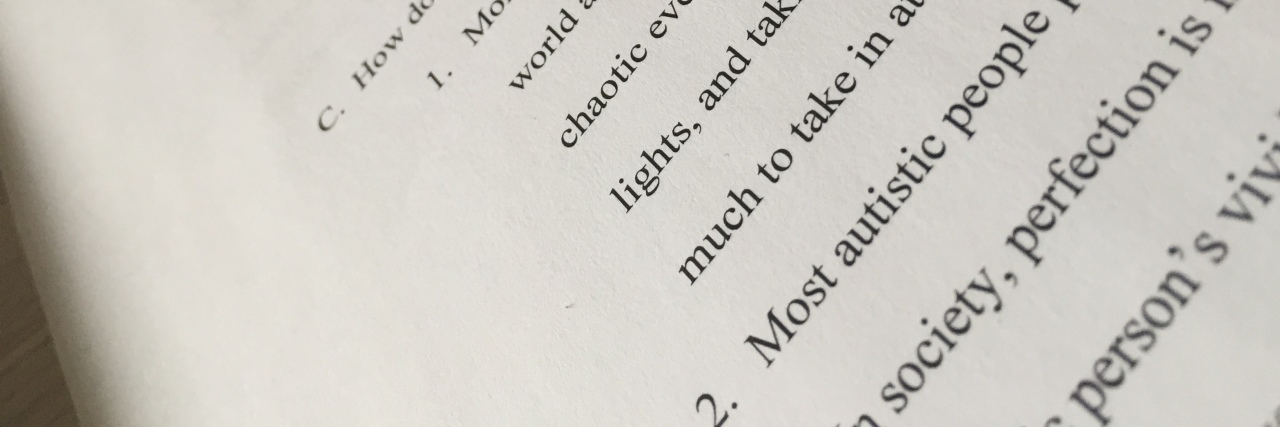My Autistic Son's Words Matter More Than Mine
Editor's Note
This story has been published with permission from the author’s son.
I will never fully understand autism because I am not autistic. To say I “get it” is not truly accurate. And this is proven to me time and again. As much as I long to get inside my son’s brain to see what he is thinking, how he is feeling and how to help him when he is struggling, I will never quite understand how autism impacts his life. That is why when we have moments when he shares any or all of those things, it feels like a gift he has so graciously given to me — if only for a moment.
Just last week, there were two occasions where he really let me in and helped me to see him; I mean really see him. One of those occasions happened when we went to see my best friend’s little girl as a hyena in her first musical performance of “The Lion King.” She wanted Ryan to be there, since in her beautiful 9-year-old mind, he is an expert as a high school theatre kid. And he wanted to go because he loves her and loves being seen as an “expert.”
Well, the audience was loud, kids behind us were talking and kicking our seats and it was hot. Like really hot. When our gorgeous hyena asked Ryan if he liked the show, he barely mumbled a “yes” and there was zero excitement in his voice. I worried that this sweet girl, who understands autism more than most 9-year-olds do, would be hurt by his lack of exuberance. Quite honestly, I was a little irritated, but I didn’t let Ryan know just how irritated I was.
The next day, I asked Ryan what was bothering him so much at the show and why he struggled to give our sweet hyena the props she was looking for and he said, “It was so hot in there and when it’s hot, my brain doesn’t work very well. It’s really, really slow and makes it difficult to talk.” Of course I felt ashamed because once again, I didn’t get it. I misinterpreted his overloaded sensory system for rudeness, something I preach to others not to do. Sigh.
I apologized to my son. Again.
My second glimpse into my beautiful son’s mind came in the form of a research project he had to complete for his English class entitled, “The Effects of Autism on the Brain.”
With Ryan’s permission (“Please share it with everyone you know,”) here are a few excerpts of his project which he presented in front of 28 high school sophomores (he is braver than I could ever be):
If you ever look upon a gathering of people, you may notice that there is one person excluded from the gathering, and that person may be carrying out unusual bodily movements or trying to avoid the nearby mass of people. You may think to yourself, “is that person OK?”, and neglect the possibility of that person having been diagnosed with autism.
How do autistic people view society?
1. More often than not, individuals with autism are most likely to see the world as an unstable place, full of utter chaos. They witness devastating, chaotic events, such as acts of terrorism, or loud noises and bright flashing lights, and taking the idea of the autistic brain functioning slowly, it is too much to take in at one single time.
2. Most autistic people prefer to live in a world where their lives are perfect. In society, perfection is impossible to achieve, and this is where the autistic person’s vivid imagination serves as a benefit. They can imagine that they live in a world where everyone is friendly, and there is little to no hatred whatsoever, and everything is perfect.
If you didn’t already know, I, Ryan, am also under the effects of autism. Whether or not you’d rather use the terms “individual with autism” or “autistic person,” someone with autism still fits in society the way a normal, non-autistic person does. Some people who are not diagnosed with autism believe that this is not true, and that instantly gives away the fact that those people probably don’t understand what autism is. If we can start to teach people about autism, as well as solve problems that autistic people greatly oppose, people with autism can fit in better, live happier lives and forever be considered “Different, not Less.”
His words are so much more powerful than mine could ever be because he is autistic and I am not. Which is why I have to listen, I have to not jump to conclusions and I have to keep trying to understand and accept behaviors that may be inexplicable to me, but, make perfect sense to him. I, too, wish we lived in a world “where everyone is friendly and there is little to no hatred whatsoever.” But until we do, I will try my best to accept what I can’t understand and help others understand, too. And even though I may blow it regularly because I am not autistic, my son knows that my love is unwavering, unconditional and unflappable, even when I am “horribly annoying and ridiculous.”

